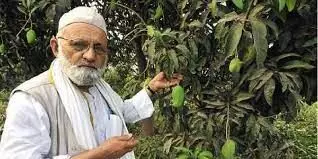
Indian man creates over 300 mango varieties from 120-year-old mango tree
text_fieldsKnown as mango man, Kaleem Ullah Khan from Malihabad in Uttar Pradesh, has created over 300 varieties of mango from a 120-year-old tree.
He describes it as a tree, an orchard, and the biggest mango college in the world. Khan's orchard has been his workplace for decades where he conducts experiments in grafting and joining plant parts.
Khan loves naming his fruits after celebrities. Some of his creations are named after Prime Minister Narendra Modi and cricketer Sachin Tendulkar. Another of his popular varieties is Anarkali aka pomegranate blossom which has two layers of different skin and two different pulps along with a distinct scent.
The 82-year-old says one of his best creations is called "Aishwarya", named after Bollywood actress Aishwarya Rai Bachchan. One Aishwarya mango weighs over a kilogram and has a reddish shade on the outer skin. "It tastes very sweet. It is as beautiful as the actress."
According to AFP, he was only a teenager at the time of his first experiment. The school dropout prepared a tree to produce seven new kinds of fruit. However, it was destroyed in a storm.
He started working with the 120-year-old tree in 1987.
Khan says no two mango varieties are similar as nature has gifted mangoes with traits like humans. His treasured specimen has leaves that are "a patchwork of different textures and smells". Some leaves are yellow and glossy. Others are dark, dull green.
The mango farmer says he can grow fruits even in a desert. Khan follows an intricate grafting method that involves slicing a branch from one variety. He will attach a branch from another variety to the open wound. The spot will remain sealed with tape until the joint becomes sturdy.
He told AFP that the branch he is working with now is expected to be ready by next season and produce a new variety of fruits in two years.
Unlike other farmers, Khan does not put all the blame on climate change for crop failure. He thinks intensive farming techniques and widespread use of cheap fertilisers and insecticides affect the trees. The experts do not recommend planting trees too tightly together.






